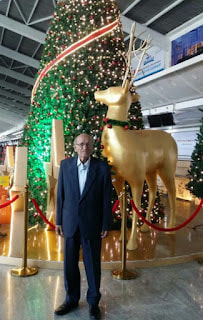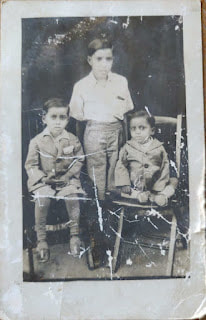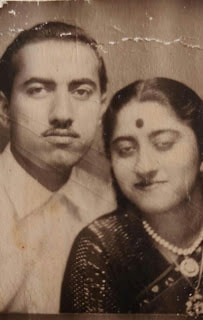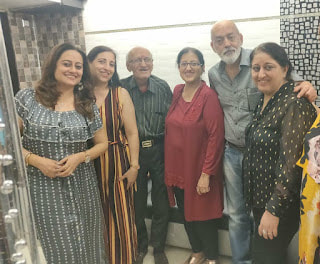From Sukkur to India Indur in a recent photo Indur in a recent photo Indur Manghanmal Malkani was born on 10th March 1938 in Sakhar (also known as Sukkur), Sindh, British India, the son of Manghanmal and Bhagwanti Malkani. Following Partition, Indur says his family was fortunate enough to leave early, so he did not witness any violence that others may have. Today, Indur lives in Mumbai, India, but remains nostalgic for the homeland that he left behind.  Indur as a young boy (seated, extreme left) Indur as a young boy (seated, extreme left) Indur Manghanmal Malkani was born the eldest child in a family of four brothers and three sisters. Together with his immediate family, they lived in a joint household with his grandmother, two chachas (paternal uncles) and their families, as was the norm in those days. Indur says his family was well-off. His father, in partnership with his two brothers, were in the jewellery business. They owned a jewellery shop called Anandram Morandram Sonaro (‘sonaro’ means goldsmith). The shop was on the ground floor of a three-storey building, while the upper two floors were where the family lived, with a separate entrance for the women of the family to use. Indur studied two grades in Sindhi in the J.B. Mangharam High School. It was a safe environment, and he would always walk to school with his friends. Relationships with neighbours were great as well and Indur reminisces about the Sindhi festival of Lal Loi being celebrated together with their neighbours. They would collect logs and sticks and burn this collection at night.  Indur and his wife Indur and his wife He also recounts visiting a place known as Sadh Belo by boat. Sadh Belo is an island on the Indus River in Sukkur, which is famous for housing the biggest Hindu temple in Pakistan. It was established in 1823 by a Hindu saint Baba Bankhandi Maharaj. In 1947, when Partition happened, Indur was a mere nine years of age. Although he says he was fortunate to not witness any violence himself, what he recalls is customers coming to their goldsmith shop to sell off their jewellery for cash to tide them over while they resettled elsewhere. Despite the uncertainty ahead, the spirit of kindness and generosity prevailed, as some of those who came into the shop to sell their jewellery would even give Indur kharchi (a cash gift, spending money). Although it was relatively peaceful at that time, a Sindhi Hindu police inspector who used to patrol in the vicinity of their goldsmith shop in Javeri Bazaar, advised his family to leave Sukkur. Indur’s father took his advice seriously and made the decision to move his family out of Pakistan. The kindly police inspector helped to book a whole train compartment to Karachi for Indur and his extended family. Before departing, the family sold all the furniture in their house to a Muslim family. They packed whatever they could, including a big trunk of kitchen utensils. Beyond that, they had to leave behind everything they had, including four houses, three of which had been purchased recently. The extended family took a train to Karachi where they spent a few days in a camp before boarding a ship bound for Bombay (now Mumbai). Sadly, their trunk of kitchen utensils was stolen in Karachi. On arrival in Bombay, they continued their journey by train to Kalyan Camp in Ulhasnagar. Formerly a British military barracks during the Second World War, it was now converted into shelters for refugees arriving during 1947-1948. Indur’s extended family of about 55 people were one of the earliest arrivals from Sindh and they were allotted eight to 10 barracks. His eldest uncle was the person in charge of giving out the rations, such as milk, in the camp. The family stayed for about one year in the camp. After leaving the camp, Indur’s father eventually rented a shop in Mahim (a neighbourhood in Bombay) and re-started his jewellery business. From the tender age of 10, Indur helped his father and uncle in their shop after school hours – he eventually followed in his father’s footsteps in going into the jewellery business. In Bombay, Indur continued his education at K.J. Khilnani High School. It was a Sindhi medium school for children of Sindhi refugees. He studied 10 grades in Sindhi and even took up Persian and Hindi as his second languages. In 1960, at the age of 22, Indur got married in Mumbai. Today, although he is officially retired, he continues to be active in the business due to, he says, the ‘goodwill’ of his long-standing customers who after many years still call him to take his advice on buying jewellery, precious stones and diamonds. Indur has four daughters and one son. He continues to reside in Mumbai. Although it has been decades since he left, Indur recalls with nostalgia the days in Sukkur when everything was so cheap. He also still remembers all the buildings and the roads in his beloved homeland which he left behind for good.
5 Comments
Vijay Rijhwani
12/31/2021 06:25:03 am
Whah , good nostalgia , for coming generations
Reply
Anonymous
12/31/2021 06:25:19 am
What an amazing journey..you are one of a kind.. truly loving! 👏😀
Reply
Anonymous
12/31/2021 06:25:33 am
Great personality, great achievement
Reply
Vijay Viru Doolani
12/31/2021 06:26:00 am
Indur Dada Namaste Dada you have lived a very humble life with a Class. Your generation had accepted struggles of rebuilding as an art of life. Salute to you and your generation.
Reply
Hiren Aswani
12/31/2021 06:26:20 am
I Love U,Indur Dada. I miss U,Mohini Dadi. I still remember My Childhood Days how I used to cry at My Home & Say Jab tak Indur Dada, Dadi ke ghar nahi le chaloge tab tak Khana nahi khaunga.How,I went to meet My fav. Indur Dada at d age of 15 on My New Kinetic Honda all on My own without having any Money in My Pocket without having a Driver's License neither was d vehicle No.Regd. only thing in My Mind was to Meet My fav. Indur Dada and go for a spin along with Him on My New Kinetic Honda.How,We then went to BandStand and were sitting across D Sea Shore and just chilling out.There are Many such Stories and really memorable moments that I can share.Which,I have had with My Fav. Indur Dada.
Reply
Your comment will be posted after it is approved.
Leave a Reply. |
AuthorKeen interest in Partition stories originating from the Province of Sindh. Archives
January 2022
Categories |

 RSS Feed
RSS Feed
